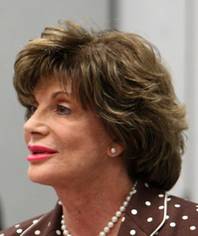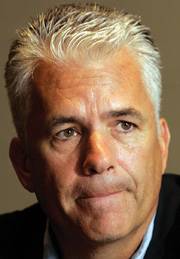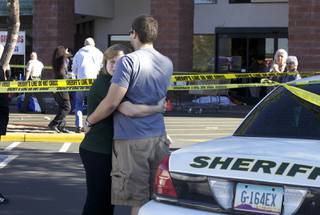Thursday, Jan. 13, 2011 | 2 a.m.

Shelley Berkley

John Ensign
Sun archives
- Congresswomen describe seeing Giffords open eye (1-12-2011)
- Gun control, tone of rhetoric take center stage after Arizona shooting (1-11-2011)
- Suspect in Arizona shooting held without bail, photo released (1-10-11)
- Tucson shooting alters congressional agenda (1-10-11)
- Tragedy brings together lawmakers on both sides of aisle (1-9-11)
- Congresswoman shot, federal judge among 6 killed in Arizona rampage (1-8-11)
Shelley Berkley on the Tucson Shooting
Is extremist rhetoric, mental illness, easy access to guns, or all of the above to blame for the tragedy in Tucson? Does Congress need to turn down the volume? Or amp up the security? Hear from Congresswoman Shelley Berkley about that and her friend and colleague, Congresswoman Gabrielle Gifford.
When Rep. Shelley Berkley makes public appearances in Las Vegas, her entourage usually includes a staffer or two and her sons. They bring along a pile of T-shirts, poker chips bearing her likeness, and “BERKLEY”-emblazoned tubes of hand sanitizer that she often presses into constituents’ hands.
Since last weekend’s shooting of Arizona Rep. Gabrielle Giffords, things have become more formal.
On Monday, two days after the incident, Berkley’s Las Vegas office swarmed with security as the media gathered for a routine news conference on health care reform. There was a cop car outside the district office and two sheriff’s deputies in the hallway. More police officers were inside the congresswoman’s reception room.
It’s a taste of what’s to come Friday, when Berkley hosts a “Congress on Your Corner” in her office — an effort to carry the torch of Giffords’ town-hall meetings.
Giffords was holding a “Congress on Your Corner” gathering in a Tucson parking lot Saturday morning when a gunman, allegedly 22-year-old Jared Lee Loughner, began firing a semi-automatic pistol. Giffords was struck in the head, leaving her with a debilitating but nonfatal wound. Six people were killed and 13 others were injured.
The event sent shock waves through the congressional community, and prompted both a review of security practices for lawmakers, and protection-enhancing proposals that range from increased district security details to sealing the House chamber in bulletproof Plexiglas.
“This is a 9/11 moment in the lifetime of congresspeople,” said Rep. G.K. Butterfield, a North Carolina Democrat, outside a briefing Capitol Hill police provided to House lawmakers Wednesday.
Although the Giffords incident was devastating, it’s not the only indication that the business of lawmaking has become somewhat more dangerous over the past several months.
In spring and summer of 2009, several lawmakers reported being mobbed, heckled and even attacked by angry constituents during town-hall forums, often over subjects such as the stimulus and health care. Police were called in on several occasions to tame unruly hordes and occasionally remove attendees — as they did in Las Vegas last fall when a fistfight broke out among rival supporters at a debate between Senate candidates Harry Reid and Sharron Angle.
Threats to federal employees have also been inching up. In 2009, the Justice Department charged 331 people for death threats. That number rose to 352 in 2010.
Many lawmakers say last weekend’s massacre was an extension of seeds sown in recent months, namely violent vitriol spouted during the 2010 campaign.
They accuse former Alaska Gov. Sarah Palin — who targeted battleground districts, including Giffords’, with cross hairs on her website, and told followers “don’t retreat, reload” — and Nevada’s Angle, who appeared to endorse “Second Amendment remedies” to settle political problems, of creating an environment in which an unstable gunman could conceivably perceive a call to stage an attack.
Palin and her supporters have shunned the accusations, accusing critics of using the Giffords incident to undermine the Tea Party movement, and arguing that the symbols and slogans had nothing to do with firearms.
Although lawmakers look for answers, they’re also struggling over how to solve the immediate problem of making sure they — and their staffs, and their constituents — feel safe.
Two lawmakers from New York’s delegation — one Democrat and one Republican — have proposed gun control measures that would respectively ban certain types of semi-automatic firearms and prevent anyone from carrying a firearm within a thousand feet of a member of Congress.
Those proposals, although politically ambitious, aren’t expected to gain much traction.
“How does anybody know they’re a thousand feet from me? Am I supposed to emit a signal?” said Massachusetts Democratic Rep. Barney Frank, who is pro-gun control, but surmised that support for even a limited ban on firearms would be “virtually none” in the GOP-led House.
Others are taking the opposite approach: promising to arm themselves. Utah Republican Rep. Jason Chaffetz and North Carolina Democrat Heath Shuler announced that they would be carrying a loaded handgun, for which they have permits, to all district events in the wake of the Giffords shooting.
But most of the discussion is centering on the professionals, and how to amp up their ability to provide enhanced security.
There’s just one, potentially prohibitive, problem: cost.
Last week, in their first set of policy moves in the new Congress, the GOP-led House on a party-line vote OK’d reducing office budgets by 5 percent. That’s money some Democrats want to see reinstated.
“So much of this depends on definition. If this is a lunatic, then this is an isolated incident. But if this is an act of domestic terrorism ... we have to provide our staff with exactly what they need,” Illinois Democratic Rep. Jesse Jackson Jr. said.
Jackson wants to restore the 5 percent cut so it can be used to improve security — primarily in congressional districts — for lawmakers and their staff.
“Since 9/11, we have not treated our district staff the same way we have treated this Capitol,” Jackson said, asking rhetorically whether, if Loughner was a foreign national, there would be any hesitation about putting more money toward congressional security.
But not all lawmakers support such efforts.
Sen. John Ensign, R-Nev., said Wednesday he plans to conduct his district business as usual.
“We are not doing anything differently — you just do the common sense things,” he said, outlining his steps toward maintaining personal safety. “I don’t want security — I don’t think 535 members of Congress should have security. It would be too expensive to have full-time security.”
Currently, most districts absorb the costs of providing security detail for local congressional events — a system that lawmakers pushing for enhanced measures say they are loath to take advantage of.
In Las Vegas, Sheriff Doug Gillespie offered protection to Berkley and other members of the Nevada delegation. Berkley hesitated at first, but accepted.
It’s a change of pace, to say the least, for a lawmaker who used to list her home phone number and address in the telephone book until an FBI agent warned her against it a few years ago, and for someone who says she’s requested security only twice during her 12-year tenure in politics, both times because she received threats.
But Berkley said she will keep the police close Friday, mostly to ease the concerns of constituents who might feel they are risking their safety by coming out to interact with their representatives. Among the injured in Tucson were several civilians, and three senior citizens and a 9-year old girl were killed.
“I’m not going to let any wing nut keep me from doing my job,” Berkley said.
Sun reporter Anjeanette Damon contributed to this report. Goldberg reported from Las Vegas.


Join the Discussion:
Check this out for a full explanation of our conversion to the LiveFyre commenting system and instructions on how to sign up for an account.
Full comments policy